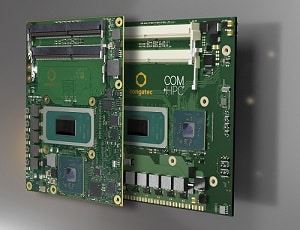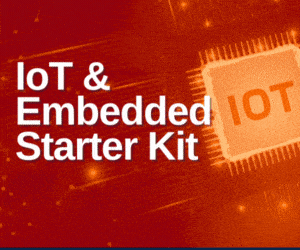They have the capability to process massive workloads required in demanding IoT gateway and edge computing applications

congatec has introduced 20 new Computer-on-Modules following the launch of Intel’s 11th generation Core processor for IoT. Featuring 11th Gen Intel Core vPro, Intel Xeon W-11000E and Intel Celeron processors, the new modules target the most demanding IoT gateway and edge computing applications.
Built on Intel’s 10nm SuperFin technology in a two-package design with dedicated CPU and platform controller hub (PCH) the new flagship COM-HPC Client and COM Express Type 6 modules impress with a new bandwidth benchmark of up to 20 PCIe Gen 4.0 lanes for massive connected real-time IIoT gateway and intelligent edge computing workloads. To process such massive workloads, the new modules boast up to 128 GB DDR4 SO‑DIMM RAM, integrated AI accelerators and up to 8 high-performance CPU cores that achieve up to 65% gain in multi-thread performance and up to 32% gain in single-thread performance. Moreover, visualisation, auditory and graphics-intensive workloads are enabled with a boost of up to 70% compared to predecessors, enhancing performance for these immersive experiences even more.
Flagship applications that directly benefit from these GPU enhancements can be found in surgery, medical imaging and e-health edge applications as congatec’s new platform supports 8K HDR videos for optimum diagnostics. Combined with the platform’s AI capabilities and the comprehensive Intel OpenVINO toolkit, doctors can gain easy access and insights into deep learning-based diagnostic data. But this is just one benefit of the integrated Intel UHD graphics, which also supports up to four 4K displays in parallel. In addition, it can process and analyse up to 40 HD 1080p/30fps video streams in parallel for 360-degree views in all directions. These AI-infused massive vision capabilities are also important for many other markets, including factory automation, machine vision for quality inspection in manufacturing, safe spaces & cities, as well as collaborative robotics and autonomous vehicles in logistics, agriculture, construction and public transport, to name just a few.
AI and deep learning inference algorithms can seamlessly run either massively parallel on the integrated GPU or on the CPU with built-in Intel Deep Learning Boost that combines three instructions into one, accelerating inference processing and situational awareness.
The new COM-HPC Client and COM Express Type 6 platforms have integrated safety functions that are important for the fail-safe operation of many mobile vehicles and robots, as well as stationary machinery. As real-time support is mandatory for such applications, the congatec modules can run RTOSes such as Real Time Linux and Wind River VxWorks, and provide native support from Real-Time Systems’ hypervisor technology, which is also officially supported by Intel. The result for customers is a truly rounded ecosystem package with the most comprehensive support possible. Further real-time capabilities include Intel Time Coordinated Computing (Intel TCC) and Time Sensitive Networking (TSN) for real-time connected IIoT/industry 4.0 gateways and edge computing devices. Enhanced security features that help to protect systems against attacks make these platforms ideal candidates for all types of critical customer applications in factories and utilities.
Detailed Feature Set
The conga-HPC/cTLH COM-HPC Client Size B modules (120mm x 120mm), as well as the conga-TS570 COM Express Basic Type 6 modules (125mm x 95mm) will be available with new scalable 11th Gen Intel Core, Xeon and Celeron processors, with selected variants even for extreme temperatures ranging from -40 to +85°C. Both form factors support up to 128 GB DDR4 SO-DIMM memory with 3200 MT/s and optional ECC. To connect peripherals with massive bandwidth the COM-HPC modules support 20 PCIe Gen 4 lanes (x16 and x4) and the COM Express versions support 16 PCIe lanes. In addition, designers can leverage 20 PCIe Gen 3 lanes with COM-HPC, and 8 PCIe Gen 3 lanes on COM Express.
To support ultra-fast NVMe SSD, the COM-HPC module provides 1x PCIe x4 interface to the carrier board. The COM Express board has NVMe SSD even onboard for optimum utilisation of all native Gen 4 lanes supported by the new processor. Further storage media can be connected via 2x SATA Gen 3 on COM-HPC and 4x SATA on COM Express.
Where the COM-HPC module offers latest 2x USB 4.0, 2x USB 3.2 Gen 2 and 8x USB 2.0, the COM Express module offers 4x USB 3.2 Gen 2 and 8x USB 2.0 in compliance with the PICMG specification. For networking, the COM-HPC module offers 2x 2.5 GbE, whereas the COM Express module executes 1x GbE, with both supporting TSN. Sound is provided via I2S and SoundWire in the COM-HPC version and HDA on the COM Express modules. Comprehensive board support packages are provided for all leading RTOSes, including hypervisor support from Real-Time Systems as well as Linux, Windows and Android.
The two 11th Gen Intel Core, Xeon and Celeron processor-based COM-HPC and COM Express Basic Type 6 modules are available in several options.






